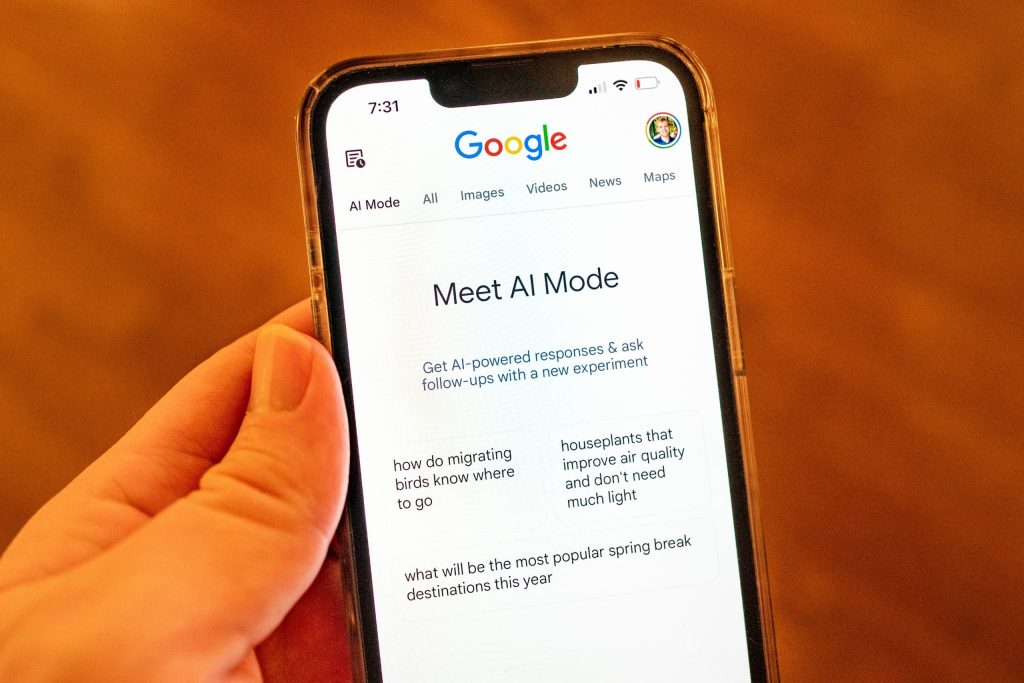The Commission is “assessing” Google’s use of AI summaries at the top of its search results under the Digital Markets Act (DMA) and EU copyright law, amid a broader structural clash over AI-aided internet services.
Since late March, Google answers search queries directly with what it calls AI Overviews of relevant information, reducing the need for users to visit content creators’ websites. The company pitches the services as a way to “find information faster and easier” but news websites are set to suffer from lower readership online.
Digital businesses live or die by what is becoming fast and easy for Google. The shift to AI generated search responses threatens publishers’ business models and is prompting scrutiny from lawyers under the EU’s competition, media, and copyright law.
“The Commission is currently assessing how the ‘Google AI Overviews’ feature works in practice and what its implications may be under EU copyright rules,” Commission spokesperson Thomas Regnier told Euractiv.
“Rules on unfair competition, platform obligations under the Digital Services Act (DSA) and DMA, and the protection of media pluralism under the European Media Freedom Act (EMFA)” may also be relevant, he said.
While no formal steps have yet been taken under the DSA, the copyright directive or the EMFA, the practice will at least be assessed as part of the Commission’s ongoing DMA investigation.
The Commission has preliminarily found the Google in violation of the DMA for self-preferential treatment for its own products in search engine results.
The preliminary findings “do not specifically address AI Overviews,” as the feature was launched after their publication. But the same principles apply, said Regnier.
In response to Euractiv’s request for comment, Google referred to blog posts outlining its view on AI and copyright, and how it complies with the DSA, DMA and the copyright directive.
Web traffic spat
Publishers and search engines benefit from a value exchange in which publishers share content in return for traffic to their websites.
AI Overviews tilt the balance of this exchange in favour of the platform, as Google takes more content itself while likely generating less traffic to content creators.
Many publishers have seen plummeting traffic after the launch of the feature, and Bloomberg reported that Google acknowledged this effect in a closed-door meeting with 20 website creators in October.
The BBC has argued that AI intermediaries threaten their brand, either by failing to demonstrate the value of the reporting, or by inaccurately summarising their articles.
A senior Google executive told Euractiv that the number of search queries increased after the introduction of AI Overviews, implying that this could benefit publishers, during a closed-door briefing in the beginning of April.
However, when asked about the effect on so-called click-through rates, the executive said they don’t share such details, as the numbers are constantly changing.
Power play?
Just a week before launching AI Overviews in Europe, Google published an experiment showing that the removal of European news publisher content from search queries had “no measurable impact” on its revenues.
The apparent show of force – and suspicious timing – angered news outlets, that argued that Google benefits from the credibility and reliability of news content, even if direct revenues from news are relatively low.
The launch of AI Overviews and the publication of the experiment results just happened to coincide, the Google executive said.
Google said its AI feature was delayed by around nine months in Europe due to legal uncertainty, and warned of the impact on Europe’s competitiveness.
With the current pace of innovation, speed to market matters a lot, and European users are actually starting to meaningfully lag, said the Google executive.
EU regulations also lead to worse products, according to Google.
“To comply with the DMA, we’ve made over 20 changes to Search,” wrote Oliver Bethell, head of competition, regulatory engagement and advisory in early March – changes which, he said, have led to lower quality, reduced traffic to businesses, and increased cybersecurity risks in Europe.
Meta recently blamed EU regulations for a delay of nearly a year in launching its own AI features. The two companies have been leading the industry charge to water down EU AI Act’s rules for general-purpose AI.
Opt-out risks
Under the EU’s copyright directive, copyrighted material may be used for research purposes under a text and data mining (TDM) exception.
“AI-generated summaries that reproduce protected content may fall under the TDM exceptions” if the material is lawfully accessible and not subject to a reservation of rights by the rights holder, Regnier said.
However, rights holders cannot opt out of being included in AI summaries – only from AI training – the Google executive said. The separation of AI search and normal search will lose meaning over time, the person added.
Google says that opting out of AI training does not impact a site’s appearance in search results, but some news outlets still fear it could impact visibility, Renate Schroeder, director of the European Federation of Journalists, told Euractiv back in October.
“We have no choice. We have to be online, we have to be visible,” Schroeder said, describing the mood at many news outlets.
Schroeder fights for high granularity in the AI Act’s mandated disclosure of “sufficiently detailed” training data summaries, so that rights holders can more easily make the case for compensation for use of their content.
Google is pushing for lenient transparency requirements and flexible use of copyrighted material.
The Commission’s AI Office will determine what training data needs to be disclosed with a template published by June.
(aw, jp)

